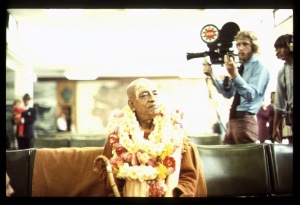SB 10.38.17

A.C. Bhaktivedanta Swami Prabhupada
TEXT 17
samarhaṇaṁ yatra nidhāya kauśikas
tathā baliś cāpa jagat-trayendratām
yad vā vihāre vraja-yoṣitāṁ śramaṁ
sparśena saugandhika-gandhy apānudat
SYNONYMS
samarhaṇam—the respectful offering; yatra—into which; nidhāya—by placing; kauśikaḥ—Purandara; tathā—as well as; baliḥ—Bali Mahārāja; ca—also; āpa—attained; jagat—of the worlds; traya—three; indratām—rulership (as Indra, the King of heaven); yat—which (lotus hand of the Lord); vā—and; vihāre—during the pastimes (of the rāsa dance); vraja-yoṣitām—of the ladies of Vraja; śramam—the fatigue; sparśena—by their contact; saugandhika—like an aromatic flower; gandhi—fragrant; apānudat—wiped away.
TRANSLATION
By offering charity to that lotus hand, Purandara and Bali earned the status of Indra, King of heaven, and during the pleasure pastimes of the rāsa dance, when the Lord wiped away the gopīs' perspiration and removed their fatigue, the touch of their faces made that hand as fragrant as a sweet flower.
PURPORT
The Purāṇas call the lotus found in the Mānasa-sarovara Lake a saugandhika. Lord Kṛṣṇa's lotus hand acquired the fragrance of this flower by coming in contact with the beautiful faces of the gopīs. This specific incident, which occurred during the rāsa-līlā, is described in the Thirty-third Chapter of the Tenth Canto.